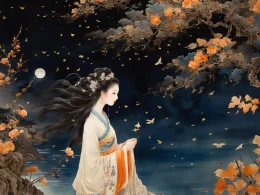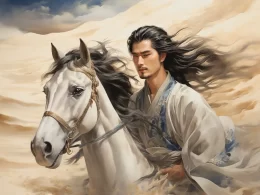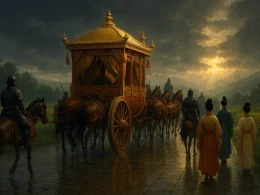By this wall that surrounds the three Qin districts,
Through a mist that makes five rivers one,
We bid each other a sad farewell,
We two officials going opposite ways...
And yet, while China holds our friendship,
And heaven remains our neighbourhood,
Why should you linger at the fork of the road,
Wiping your eyes like a heart-broken child?
Original Poem
「送杜少府之任蜀州」
王勃
城阙辅三秦, 风烟望五津。
与君离别意, 同是宦游人。
海内存知己, 天涯若比邻。
无为在歧路, 儿女共沾巾。
Interpretation
This poem was composed during Emperor Gaozong's reign of the Tang Dynasty, when the young Wang Bo served in Chang'an. Written to bid farewell to his friend Du Shaofu who was assuming office in Shuzhou (modern Chongzhou, Sichuan), it reflects the common practice of scholar-officials traveling for appointments during the High Tang period. Departing from conventional melancholy partings, Wang Bo adopts a grand, open-hearted tone that demonstrates both genuine friendship and his own magnanimous character. More than just an exemplary farewell poem, it marks the maturation of Early Tang poetry toward more expansive visions.
First Couplet: "城阙辅三秦,风烟望五津。"
Chéng què fǔ sān qín, fēng yān wàng wǔ jīn.
"The capital's towers framed by Three Qin's embrace; / Through mist and wind gaze toward River Wu's face."
The majestic opening inverts syntax ("Three Qin framing towers" becomes "towers framed by Three Qin") to accentuate Chang'an's imperial grandeur. The verb "gaze" stretches vision toward distant Shu, establishing vast spatial dimensions that imbue the farewell with solemnity.
Second Couplet: "与君离别意,同是宦游人。"
Yǔ jūn lí bié yì, tóng shì huàn yóu rén.
"What makes our parting deeply felt: / Both roam as officials, hand life was dealt."
Transitioning to emotion without indulgence, the couplet finds resonance in their shared identity as traveling officials. Its concise phrasing reveals profound understanding of their common destiny in exile.
Third Couplet: "海内存知己,天涯若比邻。"
Hǎi nèi cún zhī jǐ, tiān yá ruò bǐ lín.
"With soulmates anywhere under the sky, / Ends of earth feel like neighbors close by."
The climactic couplet transcends physical separation through spiritual connection. "Neighbors though oceans apart" has become one of Chinese literature's most celebrated lines on friendship, radiating transcendent camaraderie.
Fourth Couplet: "无为在歧路,儿女共沾巾。"
Wú wéi zài qí lù, ér nǚ gòng zhān jīn.
"No need at crossroads like children to stand, / Drenching handkerchiefs held in hand."
The conclusion counsels against sentimental tears at life's diverging paths, returning to the poem's rational magnanimity and completing an elevated farewell.
Holistic Appreciation
The poem's refined language and parallel structure convey authentic emotion while breaking from traditional parting poems' plaintiveness. Wang Bo's vigorous, open brushwork renders friendship fresh, free and powerful. From Chang'an to Shu, Three Qin to Five Ferries, vast distances are bridged by official travels and kindred spirits. Blending life's journeys with friendship's harmonies in elegant, vigorous style, the poem embodies Early Tang's innovative spirit and cultural renaissance.
Artistic Merits
The work exemplifies emotion-guided scenery, where landscapes pulse with feeling and sentiments resonate spatially. Dynamic verbs like "frame," "gaze" and "neighbor" create visual and emotional penetration. Rejecting conventional parting melancholy, Wang Bo sustains an uplifting, open-hearted tone that reflects Early Tang poets' lofty ideals and expansive character.
Insights
True friendship neither fades with distance nor diminishes at parting. At life's crossroads, composed well-wishing outweighs sorrowful lingering. Wang Bo's broad-minded, luminous style established a new paradigm for farewell poetry - not merely verses of parting, but an ode to noble affection, a portrait of life's composure, and testament to spiritual proximity beyond physical separation.
Poem translator:
Kiang Kanghu
About the Poet:
Wang Bo(王勃) was a native of Hejin, Shanxi Province, circa 650 - 676 AD. He was a native of Hejin, Shanxi Province. He showed his talent when he was young, and was known as one of the “Four Great Poets of the Early Tang Dynasty” together with Yang Jiong, Lu Zhaolin, and Luo Binwang. Wang Bo's poems emphasized his personal life, but there were also a few poems that expressed his political sentiments and implied his dissatisfaction with the rich and powerful families, and his style was relatively fresh.












